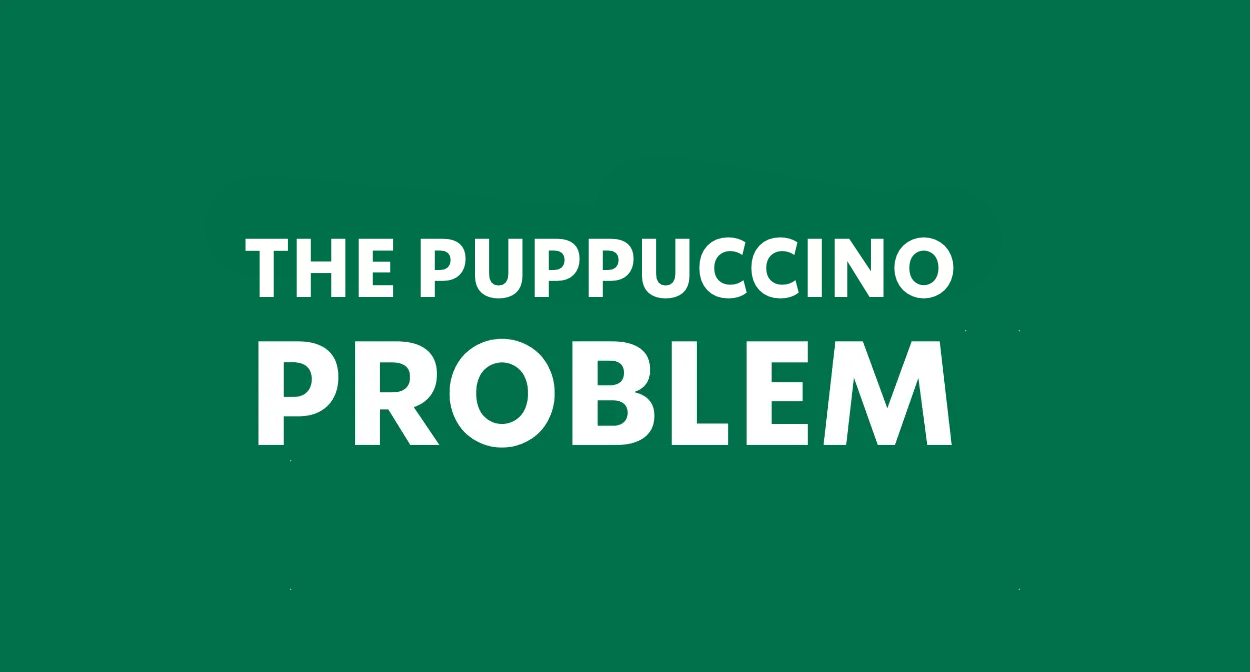The Puppuccino Problem
Puppuccino is just a fancy name for a dollop of whipped cream in a tiny cup, and while it may seem harmless, feeding your dog one can be harmful to your dog's long term health, and lead to diabetes, pancreatitis, and obesity.

If you are active on social media, you will see a post featuring a a dog tucking into a Puppuccino at least twice a day. “Puppuccino” is just a fancy name for a dollop of whipped cream in a tiny cup, and while it may seem harmless, feeding your dog one is a lazy shortcut to treat-giving and also harmful to your dog's health.
Let's look into why this trendy treat is a bad idea.
What is a Puppuccino?
A Starbucks Puppuccino is simply an espresso-shot-sized paper cup filled with whipped cream, served specifically for dogs. Starbucks offers these for free at most locations, though they don’t advertise it on their menu. It’s part of their so-called “secret menu,” a gimmick that lets dogs join in on the coffee shop fun.
The Nutritional Downside of Whipped Cream
Whipped cream might be a delightful addition to your mocha, but for dogs, it’s a nutritional void packed with fat and sugar. According to Starbucks, their whipped cream contains cream, milk, mono and diglycerides (fats used as stabilizers), and carrageenan (a thickening agent). In simple terms, it’s a fatty, sugary concoction with no place in a dog’s diet, and it can be really bad for your dogs health.
Lactose Intolerance: Many dogs are lactose intolerant, their bodies can’t digest lactose, the sugar in dairy products, leading to digestive issues like diarrhea, gas, and bloating. Whipped cream, being a dairy product, can easily cause these problems in dogs, and very often do cause these problems on a regular basis.
High Sugar and Fat Content: The calorie content of whipped cream varies, but it's typically around 50 to 110 calories with 5 to 11 grams of fat per serving. Dogs don’t need sugar in their diets. Regular consumption of sugary treats like whipped cream leads to obesity, diabetes, and dental problems. Even if the serving is small, the fat and sugar content can accumulate, leading to long-term health issues.
Health Risks Associated with Puppuccinos
Beyond the immediate digestive upsets, when you give your dog a Puppuccino you are directly introducing your dog to some serious long term health risks.
Obesity and Weight Gain: Regular consumption can contribute to weight gain and obesity in dogs. Obesity is a significant health issue in pets, leading to a reduced quality of life and increasing the risk of developing conditions such as arthritis, heart disease, and respiratory problems over the long term.
Pancreatitis: An inflammation of the pancreas, can be triggered by high-fat foods like whipped cream. Dogs predisposed to this condition can experience vomiting, diarrhea, abdominal pain, lethargy, and loss of appetite. Severe cases can be life-threatening and require immediate veterinary attention.
Diabetes: Excessive sugar consumption can lead to insulin resistance and eventually diabetes. Managing diabetes in pets involves strict dietary control, regular insulin injections, and frequent, often expensive, veterinary visits.
The Lazy Approach to Treating Dogs
Giving dogs whipped cream and calling it a Puppuccino is a lazy approach to treating pets. It’s an easy way to provide a quick and visually appealing treat, but it completely lacks any consideration for the dog’s overall health and well-being.
Opting for whipped cream shows a lack of effort in selecting appropriate and healthy treats for your pet. There are countless dog-friendly treats available that provide nutritional benefits and are safe for canine consumption. Fruits like apples, blueberries, and bananas, as well as commercially available dog treats formulated with healthy ingredients, are much better options.
Promoting Unhealthy Eating Habits
Regularly giving your dog whipped cream can set a precedent for unhealthy eating habits. Dogs that become accustomed to receiving sugary and fatty treats can often develop a preference for these types of foods, making it more difficult to maintain a balanced diet. This leads to long-term health issues and complicates efforts to manage your dog’s weight and overall health. Giving whipped cream to dogs as a treat reflects the irresponsibility and, frankly, stupidity of the dog owner.
Responsible pet owners should prioritize their dogs health and well-being over the temporary enjoyment of a sweet treat. Some pet owners may be unaware of the potential health risks associated with giving their dogs whipped cream, but ignorance is not an excuse for endangering your dogs health.
Educating yourself about proper pet nutrition and the potential dangers of certain foods and treats is a fundamental part of responsible dog ownership. Thinking puppacinos are harmless can be har to the long term health of your dog.


